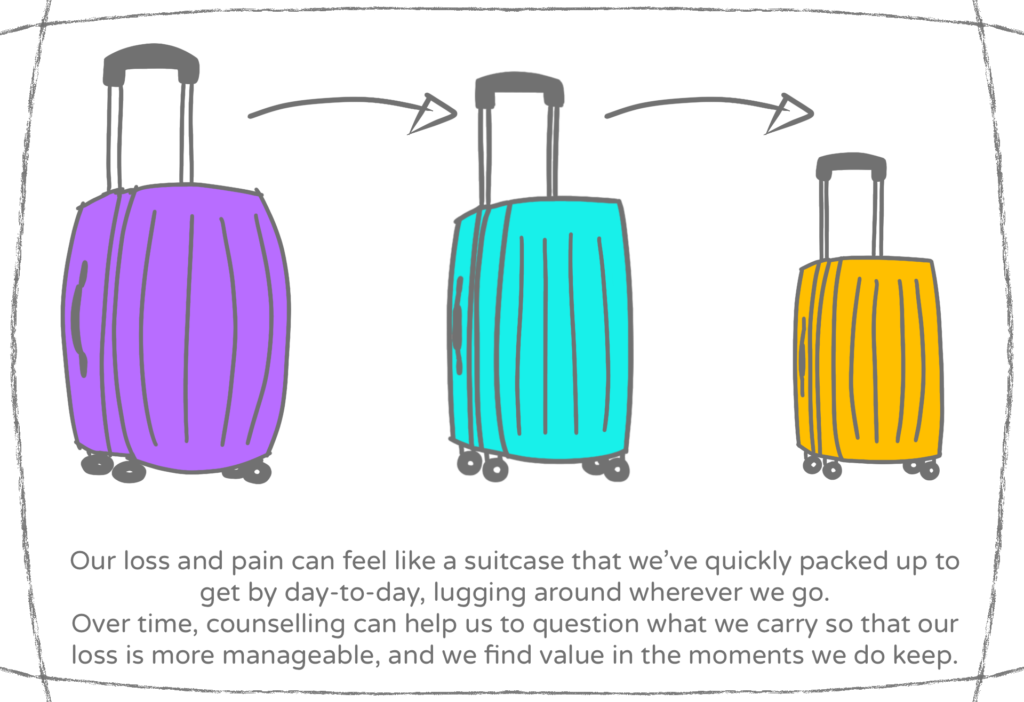Seeking support for something very personal is a daunting task. Counselling is a unique experience. Each pairing of a counsellor and a client is dependent on their individual contributing factors. There are, however, some commonalities across all. Here are some to consider when you’re deciding on counselling. As a person-centred counsellor, some aspects may only be applicable to this approach.
Contracting
As with any business arrangement, it’s important to be clear about expectations. You want to understand the policy around delays, cancellation, confidentiality, and how your records are kept. These might be detailed in writing alongside a privacy policy, but definitely covered verbally in the first session. Personally I chose to do this at the beginning of the session – to get the housekeeping out of the way, and to also give you a chance to ease into the session. It’s also an opportunity to explain, in my own words, what I hope to offer you.
Therapeutic alliance
The first session is a chance for you to get a better sense of how a counsellor operates. It’s very important that you feel comfortable with the counsellor.
“…the quality of the alliance was more predictive of positive outcome than the type of intervention…”
Regardless of whatever approach/technique used, the key to successful outcomes is the relationship. I won’t be offended if, for whatever reason, someone doesn’t click with me. May be I speak too quietly, may be I remind them of someone and it’s distracting. Counselling requires work. To be as comfortable as possible, to speak openly, makes a massive difference.
Laugh, not just cry
Counselling is serious business but it’s not always serious. Several times I’ve shared a laughing moment with clients. We need it. Laughter, like crying, is a calming balm for our nervous system. Whilst you hold a business relationship with a counsellor, it’s important that you feel able to bring all the different parts of you, including your humour.
Hold different strands of thought
As a counsellor, part of my role is a placeholder for all the different roles and thoughts you have. Whilst you might talk about your experience as a daughter, I might help you see your contrasting experiences as a wife, a mother, an employee, and how those might be causing resistance. Many times, our struggles are due to being in an emotional limbo, where we debate what we should do and what others want us to do, versus what we want to do.
Share experience
When counselling those who’ve been bereaved, they often worry about grieving correctly. As a person-centred counsellor, I follow the client’s trail of thought. Sometimes I’ll offer theories of loss, and general experiences I’ve seen other clients go through, to show the different ways that we can interpret our experience. There can be a great deal of reassurance when you realise that your experience is so common that there is a theory that exactly outlines it. Particularly when we’re in pain and grieving, our perspective so up close, it can feel impossible to see around the corner.
Daunting, tiring process
I won’t lie, counselling can be a tiring journey to embark upon. In the individual sessions, you have to carve out time to get to your session, open your heart and mind, and then seal it up again in time to sort out dinner. Those around you might notice subtle shifts as you start noticing patterns of behaviour. Whilst it’s not essential for them to be on board, it helps to have friends or family recognise and support your journey, and the courage it takes to do it. Where possible, pick a time of day and day of the week where you have the energy and space to speak openly and explore. I help encourage thoughts with some open questions, but you’ll get more from counselling when you can bring your own observations to begin with.
Use of metaphors
Our experiences and feelings can be so …?… intangible that metaphors can help us to piece together different aspects. They can help us to stand back and look with less judgement, and more curiosity. Personally I like to see the counselling experience as helping a client to sort out their literal baggage.

For example, when we’re suddenly thrown into a situation of loss – whether a breakup, a loss of a job, or a person, we still have to function. So we quickly gather what we can from the floor – our pride, our trust, our dreams – and stuff them into the nearest suitcase we can find.
Not only is it heavy and clunky, it stinks and overpowers each moment. We drag it around every day and our shoulders and back are so stiff. During a counselling session, we stop.
We gently open it up and have a look. We question what really needs to stay in there – what just got caught up in the gathering, and what do we want to cherish? We find new places to store things. Overtime, when we’re not being rushed, we find a nicer suitcase. We don’t need one as big. We don’t need to carry everything with us each day.
Wrapping up
Lastly, towards the end of each session and the counselling relationship as a whole, the counsellor does their best to ensure the client leaves in a good way. When I tell clients they’ve got 10 minutes to go, it can be tricky having to interrupt their current flow, but it’s even more harsh to bluntly stop them, or even overrun on a session. Those last few minutes are a time for you to carefully fold and wrap things up again so that they fit comfortably in the suitcase, ready for when you want to look at it next time.
